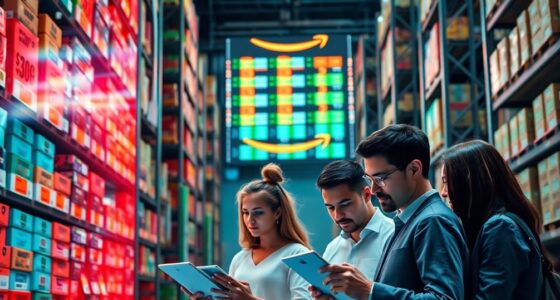Invite-only coupons are gaining popularity because brands love using scarcity to make offers feel more exclusive and valuable. When access is limited and sent privately, you’re prompted to act quickly, boosting redemption and creating a sense of privilege. This strategy helps brands build loyalty, gather data, and elevate their image. If you want to explore how scarcity drives consumer behavior and why these deals are so effective, there’s even more to discover ahead.
Key Takeaways
- Invite-only coupons create perceived exclusivity, boosting consumer desire and engagement through scarcity.
- Brands leverage limited access to foster urgency, increasing redemption rates and purchase frequency.
- Scarcity enhances brand prestige, appealing to high-value and loyal customers seeking personalized experiences.
- Controlled distribution reduces misuse and encourages quick decisions, optimizing marketing ROI.
- Exclusivity and scarcity drive word-of-mouth marketing, amplifying brand awareness and customer loyalty.

Have you ever received an exclusive offer that made you feel special? That sense of privilege often comes from the fact that the deal isn’t available to everyone. Invite-only coupons are precisely that—they’re exclusive discounts sent only to a select group of customers through direct invitations. These offers aren’t posted publicly; instead, they’re shared via email, private apps, or specialized membership portals. This method of distribution creates a sense of scarcity, making the coupon feel more valuable and desirable. When access is limited, you tend to perceive the deal as something special, which can motivate you to act quickly.
Exclusive invite-only coupons create a sense of scarcity and make deals feel more valuable and desirable.
From a brand’s perspective, invite-only coupons serve multiple strategic purposes. By limiting access, brands generate urgency, which increases the likelihood of redemption. Customers who receive these exclusive offers often feel recognized and appreciated, strengthening their emotional connection to the brand. This targeted approach lets brands focus on high-value segments or loyal customers, improving marketing ROI. It’s a way to reward repeat buyers or long-term clients, fostering loyalty and encouraging continued engagement. Since the distribution is controlled, brands can also gather valuable data on consumer behavior within this select group, helping them refine future campaigns. Plus, the exclusivity elevates the brand’s image, positioning it as premium and personalized. Additionally, the perceived value of exclusivity often leads to increased customer satisfaction and brand advocacy.
As a recipient, you’re more likely to view invite-only coupons as valuable because of their limited availability. This perception often prompts faster purchase decisions, boosting sales for brands. These offers also tend to increase customer lifetime value by encouraging repeated purchases within the exclusive group. Because distribution is tightly managed, the chances of misuse drop considerably, and sharing positive experiences with friends can amplify word-of-mouth marketing. You might find yourself keen to share these deals with others, further extending the brand’s reach. According to recent studies, digital coupon redemption rates continue to rise, highlighting the effectiveness of exclusive offers in driving consumer engagement. The increasing reliance on mobile devices further emphasizes the importance of well-targeted, exclusive deals that are easy to redeem on the go.
Statistics show that coupon use is on the rise, with redemption rates increasing over recent years. In 2024, more consumers are relying on coupons, especially digital ones, which are accessed overwhelmingly via smartphones. This mobile trend underscores the importance of personalized, exclusive offers that can be easily redeemed on the go. Despite fluctuations in distribution methods, invite-only coupons remain effective because of their exclusivity and targeted nature. However, brands must balance scarcity with accessibility; overly restrictive offers could frustrate customers or alienate broader audiences. Ensuring seamless communication and tracking is key to maintaining trust and maximizing redemption rates.
Luxury brands, boutique shops, travel companies, and specialty retailers frequently leverage invite-only coupons to uphold their prestige and foster long-term loyalty. These exclusive deals create a sense of privilege that appeals to consumers seeking personalized experiences. Ultimately, the rise of invite-only coupons highlights how scarcity and exclusivity can drive consumer engagement, making both brands and customers feel valued in a crowded marketplace.
Frequently Asked Questions
How Do Brands Track the Success of Invite-Only Coupons?
You can track the success of invite-only coupons by monitoring key metrics like redemption rates, which show how many recipients use the offer. You’ll also want to analyze incremental sales during campaigns, customer segmentation responses, and repeat purchase rates. Using real-time dashboards helps you adjust strategies quickly. Additionally, tracking social sharing, referral activity, and customer sentiment provides insights into the campaign’s broader impact on brand loyalty and perception.
What Are the Privacy Concerns With Exclusive Coupon Distribution?
You might not realize, but exclusive coupon distribution raises serious privacy concerns for you. Brands often track your behavior, device info, and location to validate and restrict coupon use. They may collect sensitive data like health or employment details, often without clear consent. This extensive monitoring blurs marketing with intrusive surveillance, risking your personal privacy. Additionally, geofencing and real-time tracking can feel invasive, making you vulnerable to unwanted data collection and exploitation.
Can Consumers Resell or Share Invite-Only Coupons?
You might think sharing or reselling invite-only coupons is harmless, but it’s a risky game with big consequences. Many brands include strict non-transferability clauses, and laws can heavily penalize reselling—sometimes even voiding the coupons or triggering legal action. If you share or resell, you could face invalidated discounts, legal trouble, or even being banned. So, think twice before trying to turn exclusive coupons into profit — it’s not worth the risk!
How Do Brands Decide Who Receives an Invite-Only Coupon?
You might wonder how brands choose who gets invite-only coupons. They analyze your engagement, purchase history, and demographic details to identify loyal, high-value customers. If you’ve shown consistent interest or participate in brand activities, you’re more likely to receive an invitation. Brands also consider your social influence or connection to other loyal customers, aiming to reward those most aligned with their campaign goals and maximize the exclusivity effect.
Are Invite-Only Coupons Effective Across All Industries?
Invite-only coupons aren’t effective across all industries. They work best in sectors relying on trust, exclusivity, or community, like tech, social media, or luxury goods. You’ll see less impact in markets with low differentiation or quick impulse buys. Operational complexity and limited appeal in mass markets can also reduce their effectiveness. To succeed, you need to clearly communicate the value and exclusivity, tailoring strategies to your industry’s dynamics.
Conclusion
You might be surprised to learn that 70% of consumers feel more valued when they receive invite-only coupons. This sense of exclusivity not only fuels curiosity but also boosts brand loyalty. By creating scarcity, brands tap into your desire for unique experiences, making you more likely to engage and make a purchase. So, next time you receive an invite-only offer, remember—it’s all about making you feel special and driving those memorable connections.









